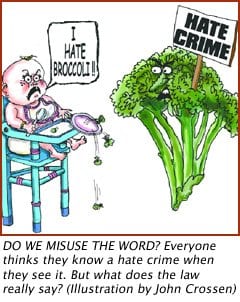Two years after sexual orientation was included as a protected ground under Canada’s hate propaganda laws, a man was sentenced in Jun 2006 for committing a hate crime for vandalizing Capital Xtra’s newspaper boxes.
In Dec 2004, a Crown attorney refused to use hate crimes legislation in prosecuting a man convicted of murdering Aaron Webster — a Vancouver gay man beaten to death in a popular cruising area.
Ryan Cran, Webster’s killer, was sentenced to six years. Thomas Strain, convicted of vandalizing the newspaper boxes, was sentenced to three months of house arrest and a year’s probation, with the full assent of the judge, the Crown and the defence.
So, do the laws enacted to protect gays and lesbians against hate crimes work? Or are they censorship laws whose use makes hypocrites of the queer community?
Howard Shulman, the coordinator of Toronto’s 519 Community Centre’s anti-violence program, says the existence of Canada’s hate crimes laws is positive more for its social message than its actual criminal code provisions.
“I think in some ways it is effective,” says Shulman. “It shows that these kinds of attacks are abhorrent to Canadians.”
But Shulman says the actual use of the laws is far less effective. Shulman says that while, in his experience, police and Crown prosecutors are ready to use the laws, judges are reluctant.
“No, I don’t think they are used effectively, especially when it comes to sentencing. Because most bashers are first-time offenders, judges don’t want to give stiffer sentences. Then justice really isn’t done. Often we have to prepare our clients for that.”
And in terms of acting as a deterrent, the extent to which hate crimes legislation serves that purpose is up for debate. In Toronto, at least, the number of hate crimes against gays and lesbians increased in 2006.
Xtra, the Toronto sibling of Capital Xtra, reported in March that the Toronto Police Service’s 2006 Annual Hate/Bias Crime Statistical Report showed that the number of crimes in which victims were targeted because of their sexual orientation rose to 18 in 2006, up from 13 in 2005.
Overall, there were 162 reported hate crimes, up from 132 in 2005. The victim groups most targeted were the black people (48 incidents), Jewish people (28) and homosexuals.
But the report shows that the 18 are fewer than the annual average of 19 incidents since these statistics were first released in 1993.
Det Const Jack Gurr of Toronto’s Hate Crimes Unit told Xtra that more and more people are reporting such crimes.
“The number of reported offences I think is indicative of the [gay] community being vigilant in reporting them,” said Gurr in March.
Offences include mischief, harassment, assault, threats and sexual assault. The years 1998 and 1999 — before sexual orientation was added to the hate propaganda section — were the worst for hate crimes involving sexual orientation: 44 offences in 1999, 31 in 1998.
But Shulman told Xtra that hate crimes are still significantly underreported.
“Research has shown that only one in 10 hate crimes are reported,” said Shulman in March. “So it is massively underreported. In 2006, we had 50 reports coming into The 519. The police have fewer hate crimes reported than we do because they are going strictly by the Criminal Code. So they don’t, for example, count verbal harassment.”
But, questions of effectiveness aside, critics of the laws say that supporting laws that criminalize expression of views is a stance contrary to the queer community’s interests and history.
“If you take the view that censorship is appropriate in certain areas, it will come back to bite you, particularly when it comes to sexual expression,” says Murray Mollard, the executive director of the British Columbia Civil Liberties Association. “It sets up the community for repression of liberty interests in terms of sexual expression. It’s a tremendous danger. I think activists have to be very cautious about being enthusiastic about suppressing free expression.”
Mollard says that laws intended to protect minorities often end up being used in unintended ways. He points to the use of obscenity laws, created to protect women from exploitation, against the queer community and Little Sister’s bookstore in Vancouver.
“Now the state has used obscenity laws to criminalize expression. Anyone who doesn’t want the state to censor sexual expression, if consistent, would not want the state to censor speech either.”
Mollard says that trusting the state to interpret meaning can also be a very risky thing. He says that “the indeterminacy of language” can make meaning hard to determine.
“Words in one moment, depending on the intent, can mean very different things. Take the word queer. Years ago, queer was a derogatory label. It was recaptured by the community to be a positive term.”
But Mollard says that he does believe the existence of the laws has contributed to a change in behaviour.
“It has been used, it’s not an empty law. It probably has an impact on people’s speech. For those who would want to censor speech, that would be a good thing. From our point of view, that’s a bad thing.”
Mollard adds that such laws are also counter-productive in terms of publicizing hatred and removing opportunities for education.
“From a practical perspective, hate speech prosecutions tend to provide a much wider platform than would otherwise be the case. If we didn’t have hate speech laws, would anyone know Ernst Zundel? Censorship also removes the chance to identify who out there is fomenting these hateful ideas, actually identifying leaders who are leaders of hate. Where there’s words that are spoken that are hateful, it provides an opportunity for education.”


 Why you can trust Xtra
Why you can trust Xtra


